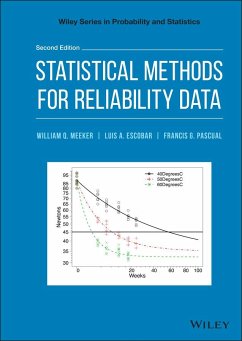Klaus Krippendorff
Gebundenes Buch
The Reliability of Generating Data
Versandkostenfrei!
Versandfertig in 1-2 Wochen
Weitere Ausgaben:

PAYBACK Punkte
66 °P sammeln!




This book expands on the authorâ s seminal work in content analysis and develops methods for assessing the reliability of the kind of data that previously defied evaluations for this purpose.
Klaus Krippendorff, PhD., PhD.hc, graduate from the Ulm School of Design and the University of Illinois, Urbana, was the Gregory Bateson Professor Emeritus for Cybernetics, Language, and Culture at the Annenberg School for Communication, University of Pennsylvania. He wrote his dissertation on content analysis at a time when this method was quite underdeveloped. Content Analysis, An Introduction to its Methodology became a leading text now in its 4th Edition. The book earned the International Communication Association (ICA)'s 2004 recognition as the most influential work. The issue of reliability followed him into numerous empirical ventures. It taught him that data cannot be taken as the starting point of scientific research without knowing how they came about, what they mean, and for whom besides their analyst. In 2012, the Methodology Division of the Association for Education in Journalism and Mass Communication (AEJMC) recognized his "Agreement and Information in the Reliability of Coding" as their "Article of the Year." He wrote over a hundred frequently cited publications, not only on reliability but also On Communicating, Otherness, Meaning, and Information. In the area of design, he advocated a human interactive approach to understanding technological artifacts as well as of the design discourse that guide them: The Semantic Turn, A new Foundation for Design. In the area of Cybernetics, he received several awards for his contributions in the form of books and articles in academic journals. He wrote and taught seminars on the discursive construction of realities, not just of the social world but also of what natural scientists say they describe. He co-edited Discourses in Action; What Language Enables Us to Do . He critically explored how such constructions impact everyday life, for example, the algorithms we live with. His focus was on the possibilities of emancipation from oppression due to widely shared but burdensome realities, mistaken as unalterable facts. This frames the first chapter of the book, starting with answering the question "When are Data?" Klaus Kripendorff passed away in October 2022.
Produktdetails
- Verlag: Taylor & Francis Ltd
- Seitenzahl: 330
- Erscheinungstermin: 23. Dezember 2022
- Englisch
- Abmessung: 260mm x 183mm x 22mm
- Gewicht: 786g
- ISBN-13: 9780367630713
- ISBN-10: 0367630710
- Artikelnr.: 59992835
Herstellerkennzeichnung
Libri GmbH
Europaallee 1
36244 Bad Hersfeld
gpsr@libri.de
Für dieses Produkt wurde noch keine Bewertung abgegeben. Wir würden uns sehr freuen, wenn du die erste Bewertung schreibst!
Eine Bewertung schreiben
Eine Bewertung schreiben
Andere Kunden interessierten sich für














